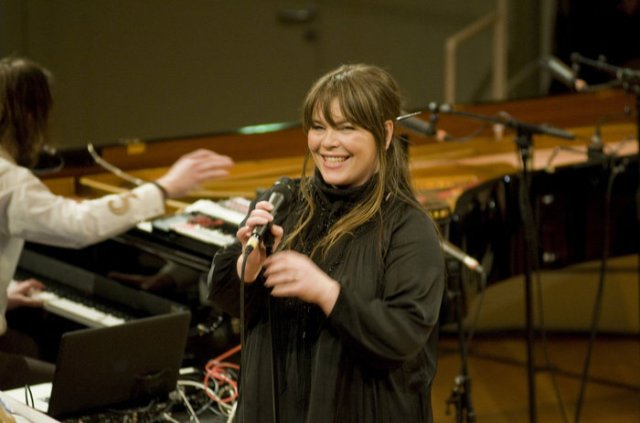
The first Jazz at Berlin Philharmonic album featuring pianists Iiro Rantala, Michael Wollny, and Leszek Możdżer was interesting for a number of reasons chief among them the fact that the concert was able to take place at the home of the Berlin Philharmonic, in the Kammermusiksaal, the chamber music room, at all. The label sees the series as its own Jazz At The Philharmonic, in the Norman Granz mould. This latest album was recorded live in March this year and features Norwegian piano trio In the Country, pianist Morten Qvenild, bassist Roger Arntzen, and drummer Pål Hausken the core band on Norwegian Woods (no Beatles connection at all by the way) with other Norwegian connections here including appearances by the hush-laden singer Solveig Slettahjell and nu-jazz pioneer Bugge Wesseltoft with guitarist Knut Reiersrud also guesting. Opening with polite applause, Reiersrud’s eerily Eastern sounding guitar on a traditional Norwegian melody morphing into a serene mood Slettahjell magnificently mournful and folk-like. Quenild’s tune ‘Can I Come Home Now’ alters the mood and moves the album into a severe piano trio situation Arntzen’s double bass gradually adding warmth, a grandeur somehow evoked and like the first album in this series the ambient sound in the room adding to the handsome reverberation.
Washed in electronics at times, treated guitar and Bugge’s synths primarily, Norwegian Woods is an album that could not have been made in the distant jazz past and is very much about the post-swing age. Americana flavours pop up including John Hiatt’s ‘Have a Little Faith in Me’ from the 80s Slettahjell here moody and quite bluesy without really trying to be. Ponderous it might be there’s no sense of rush: Bugge Wesseltoft’s piano introduction on Steve Kuhn’s ‘Chicken Feathers’ (the tune appeared on the former Coltrane pianist’s 1972 trio album Steve Kuhn Live in New York) is one of the best parts of all, beautifully gathered and sensitive, Wesseltoft taking on a Mehldau-esque swagger. Reiersrud contributes a couple of tunes in the middle part of the album where again the folk element is strong but the pace falters a little the Americana stylings on the traditional ‘Ned I Vester Soli Glader’ a backdrop to Slettahjell’s beautiful voice. The album also achingly taps late-1990s Mule Variations period Tom Waits again seemingly perfect for Slettahjell and melds electronics with the traditional on the concluding spiritual, Reiersrud’s harmonica magnificent in its repose on ‘Nobody’s Fault But Mine.’ SG
Solveig Slettahjell, above. Photo Dieter Strothmann / ACT
Released on 8 June